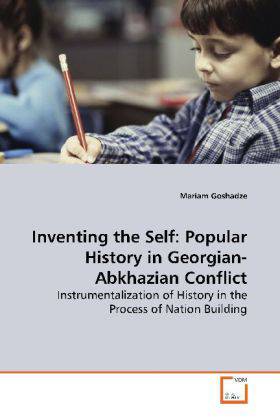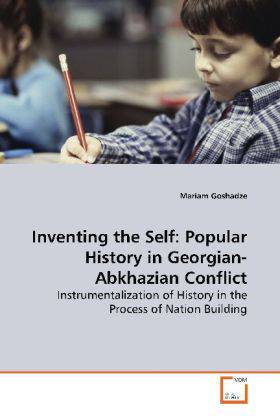
Bedankt voor het vertrouwen het afgelopen jaar! Om jou te bedanken bieden we GRATIS verzending (in België) aan op alles gedurende de hele maand januari.
- Afhalen na 1 uur in een winkel met voorraad
- In januari gratis thuislevering in België
- Ruim aanbod met 7 miljoen producten
Bedankt voor het vertrouwen het afgelopen jaar! Om jou te bedanken bieden we GRATIS verzending (in België) aan op alles gedurende de hele maand januari.
- Afhalen na 1 uur in een winkel met voorraad
- In januari gratis thuislevering in België
- Ruim aanbod met 7 miljoen producten
Zoeken
Inventing the Self: Popular History in Georgian-Abkhazian Conflict
Instrumentalization of History in the Process of Nation Building
Mariam Goshadze
Paperback | Engels
€ 64,45
+ 128 punten
Omschrijving
Right after the disintegration of the Soviet Union,
previously autonomous regions of Georgia Abkhazia
and South-Ossetia demanded their independence.
Political confrontation continues even today. In
parallel with the political events, the story of
national consistence is born outside the political
scene, namely in academic and educational
institutions.
I have approached this conflict from the perspective
of national identity constructed in the historical
dialogue. Georgia and Abkhazia offer different
interpretations of the same history. If Georgia
considers this region as its historical belonging,
Abkhazia highlights its unique identity and
independence. Newly created historical myths define
perception of the self and the other similar to the
political situation. Only by stepping out from the
informational vacuum of one s own country and
grasping the peculiarities of identity-building will
it be possible to deal with the conflict either on
political or on cultural level.
previously autonomous regions of Georgia Abkhazia
and South-Ossetia demanded their independence.
Political confrontation continues even today. In
parallel with the political events, the story of
national consistence is born outside the political
scene, namely in academic and educational
institutions.
I have approached this conflict from the perspective
of national identity constructed in the historical
dialogue. Georgia and Abkhazia offer different
interpretations of the same history. If Georgia
considers this region as its historical belonging,
Abkhazia highlights its unique identity and
independence. Newly created historical myths define
perception of the self and the other similar to the
political situation. Only by stepping out from the
informational vacuum of one s own country and
grasping the peculiarities of identity-building will
it be possible to deal with the conflict either on
political or on cultural level.
Specificaties
Betrokkenen
- Auteur(s):
- Uitgeverij:
Inhoud
- Aantal bladzijden:
- 60
- Taal:
- Engels
Eigenschappen
- Productcode (EAN):
- 9783836492881
- Verschijningsdatum:
- 15/04/2009
- Uitvoering:
- Paperback
- Afmetingen:
- 150 mm x 220 mm
- Gewicht:
- 97 g

Alleen bij Standaard Boekhandel
+ 128 punten op je klantenkaart van Standaard Boekhandel
Beoordelingen
We publiceren alleen reviews die voldoen aan de voorwaarden voor reviews. Bekijk onze voorwaarden voor reviews.









